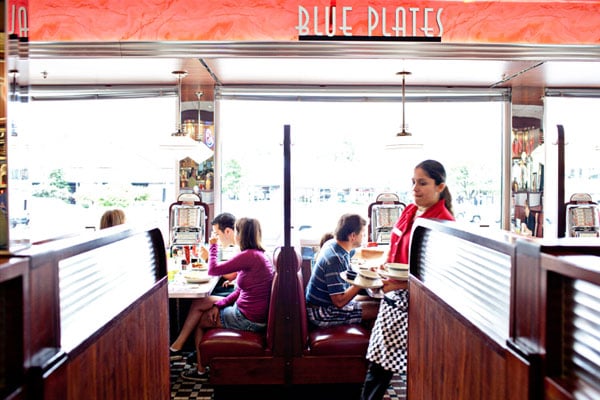Of the 370,000 businesses that applied for pandemic relief from the Small Business Administration’s Restaurant Revitalization Fund, less than a third actually received any money. Thanks to a data dump from the agency last Friday, now we know exactly who those lucky few are.
A total of 101,004 food and drink businesses across the country received grants totaling $28.6 billion. Just over 730 of those are in DC, 2,o24 are in Maryland, and 2,729 are in Virginia. Silver Diner, Ridgewells Catering, and a Reagan National Airport concessions company were among those to receive the maximum grants of $10 million. In DC, the group behind Chef Geoff’s and Tortilla Coast received $8.2 million—more than any other businesses in the city. Compass Coffee, the Park at 14th, and Del Mar all received grants of at least $5 million. The majority of local recipients, however, received between $50,000 and $1 million.
Restaurant Association Metropolitan Washington CEO Kathy Hollinger says DC-area restaurants had a slightly higher success rate than the national average, but that doesn’t count for much.
“This is an atrocious program. It was designed to fail if it was never going to be fully funded,” she says. Businesses that submitted applications asked for a total of $76 billion, more than triple the amount ultimately doled out.
While forgivable loans from the Paycheck Protection Program (PPP) were primarily intended to pay employee wages and salaries, RRF grants can be used more broadly for anything from rent to maintenance to food and beverage expenses. Although the program is called the “Restaurant” Revitalization Fund, it was also open to a wide range of food and drink businesses, including breweries, caterers, and some inns. Publicly traded companies and restaurants with more than 20 locations weren’t eligible, but franchise owners were. According to an analysis by the Counter, one in 10 RRF recipients were part of a franchise, including Subway and Golden Corral. Also notable: 5-percent of restaurants received 40-percent of the funds.
The fact that so few restaurants were funded has already fostered some bad blood among the have and have-nots. “It really created incredibly polarizing emotions and realities,” Hollinger says. “No restaurant operator who received funding wants to feel the angst that they did when their colleagues and their neighbors did not. No one can ever take away the fact that everyone needed help in this industry.”
Restaurants owned by women, veterans, and socially or economically disadvantaged people were initially prioritized for funds, but disbursements to 2,965 businesses were halted after a conservative legal group founded by Trump advisors Stephen Miller and Mark Meadows filed a lawsuit on behalf of a Texas restaurant claiming that the program was discriminatory against white men.
Pizzeria Paradiso was among an additional group of businesses approved for funds that never received them. Owner Ruth Gresser says she later learned there was some kind of code error on her application.
“A great deal of the world is talking about the pandemic in the past tense, and that’s not true for the restaurant industry,” Gresser says. “There’s still so much uncertainty… I really can’t even begin to project when a true recovery is going to happen.”
Gresser says the funds are critical to to that true recovery. Her business, for example, has put off big repairs and upgrades, such as replacing an air conditioning unit, in order to make it through the pandemic.
Hollinger adds that back rent is the biggest concern for her restaurant members, especially after DC’s eviction moratorium lifted. “There was an entire year and some of deferred payments on many levels,” she says. “For those who did not receive [RRF funds], there are probably a lot of unanswered questions and difficult decisions that need to be considered.”
Lawmakers have introduced legislation with bipartisan support to replenish the fund with an additional $60 billion, but a massive infrastructure bill has been drawing their attention elsewhere. Plus, there’s a reluctance, mostly on the part of Republicans, to spend even more money on a pandemic-related business bailout.
“I don’t believe anything will really happen until the end of the summer, which is unfortunate,” Hollinger says. “But we all have to be relentless.”
Want to see which other restaurants received RRF funds? You can find the raw data released by the SBA here, and Washington Business Journal helpfully created an easy-to-search database here.














